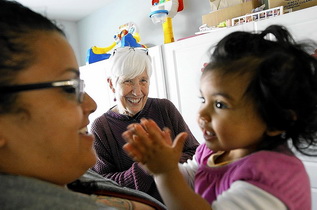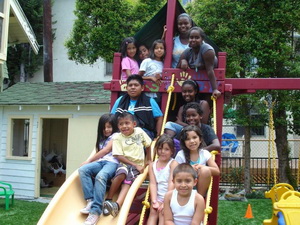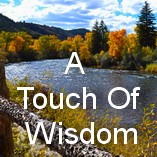"Back in the days" when I was in graduate school I was challenged by my colleagues and peers at the University of Chicago, that if I really wanted to work for change I should be grounded in the life experience of most people struggling to survive. So in 1982, after finishing my Ph.D., I made the decision to resign from Mount St. Mary's College as a sociology and anthropology associate professor, and took a job as Director at the Los Angeles House of Ruth. I really loved the work and learned something every day. One of the very first women I worked with (her name was Via) would say to me as I went out to give talks - "Judy, do people really know how hard it is for us to survive? You need to tell them."
After four years at House of Ruth I made the decision to spend some time in Nicaragua via Guatemala to study Spanish. I went to Nicaragua at the time the US government was trying to overthrow the legally elected Sandinista
government. I had been very active in the Coalition to Stop U.S. Intervention in Central America and the Caribbean and knew that there was a need for North Americans to accompanying Nicaraguans as they picked coffee hopefully to offer them so kind of protection. (I also picked some coffee but very poorly!) My "mother in the movement" (Marge Tuite) died unexpectedly in 1986 and I was asked if I would come take her position as Director of a Catholic feminist organization called NARW (National Assembly of Religious Women) based in Chicago. I held this position from 1987 - 1992 and in 1992 worked for several years at an organization called Women for Guatemala. In the mid-1990s I was anxious to get back home - my parents were getting older and my base of support and activism was here. In the summer of 1995 I heard that the Immaculate Heart Community had a house that they wanted to use of behalf of women and children. I put in a proposal to IHC and met with the community in February 1996. They said yes to the vision/plan; I moved in on May 1st, 1996 and we opened on September 21st, 1996.
Judy's story continues in her own words:
It was (and is) just one more step in the journey towards living radically. That's what Marge Tuite, a long time Catholic activist had asked me back in 1980 . . . "do you want to be a liberal or a radical?"
A friend of mine Renny Golden - a poet and activist - wrote a poem in memory of the four North American churchwomen assassinated in El Salvador. One of the lines of the poem reads: "Remember us then, as the ones the people taught courage." I think this is what motivates me and "really burns within" - it is the extraordinary courage of ordinary women that I witness and experience every day. I have been incredibly blessed in my life to have many opportunities to witness the heroic acts of kindness and generosity from women who are struggling every day to create a better life for their children and for themselves. When I was leaving Chicago Renny wrote me a poem entitled "What you Leave Behind." The last lines of this poem are:
This is your gamble Judy.
This stubborn hunch and the whisper of fierce angels
Who were organizers in their first life.
That's what you leave us . . .
Ordinary hope in the people.
As a Christian I believe that the transcendent can be made immanent; that the vision that Jesus shared of a "beloved community" is possible as least in glimpses here and now. THAT'S WHAT Alexandria House is for me . . . a glimpse and a promise of what is possible - a beloved community where people
come together from all different life experiences, cultures and languages and learn how to respect and be there for each other. And in those moments when this happens, it is miraculous!
Transitional residence programs are by definition up to two years. We have had women stay as short as two weeks and as long as slightly over two years. The average length of stay is 10 months, though with the lack of affordable housing it is closer now to 11 months or a year. A lot depends on where a person comes into a program. If it is someone who has just been freed from a trafficking situation it may take longer as they learn the language, heal from the trauma and find a way to save money than someone who might already have a job and just need to find another place to live.
As a feminist and an activist I would hold to bell hooks' challenge to address discrimination and injustice wherever it is foundâ€"in relationships and in structures/systems. Over the years I have been arrested for various issues including anti-war (Persian Gulf, Iraq); cuts in public benefits, especially General Relief (GR) and benefits for women and children; efforts to stop U.S. Intervention in Central America; anti-apartheid; and injustice in the institutional Catholic Church especially related to women's ordination as well as the RC position on homosexuality. A group of us were sanctioned when we asked that there be dialogue on the issues of abortion - a statement that was published in the New York Times in 1984. Part of the perspective here at the House is that what some might define as personal problems are also public issues and in our work we need to focus on both - it is not just that a family is homeless. This reality fits within a context of no affordable housing, cuts in adult education, lack of affordable child care, inadequate resources and services for those who are mentally ill, lack of a living wage etc. An indigenous activist Marilyn James made the statement that "you need to work on those issues that stick like a wash cloth in your throat." The disparity of wealth, the disparity between those who have and get more and those who don't have and need to work so hard to hang onto the little they have is one of those issues.
I have been so blessed in my life to have opportunities and experiences that are truly revolutionizing - serving as the US liaison for an international organizing effort to close the military installations in Honduras; traveling into the jungles of Guatemala to be a part of the Communities of Populations in Resistance; walking with the Women in Black on the first anniversary of the assassination of the four churchwomen to demonstrate against the atrocities against the Salvadoran people; accompanying women to court as they courageously testify against their traffickers. . . being part of the sanctuary movement and accompanying men and women as they shared their stories of incredible trauma and loss; being at the funeral of a young mother's third child in Nicaragua due to malnutrition and the lack of simple supplies such as milk because of the US embargo . . . and in the midst of this witnessing such faith and also a joy and a deep, deep love of life.
And if all of this isn't enough to keep one humble, through the amazing wisdom of a Loving God I am a parent of a teenager!





